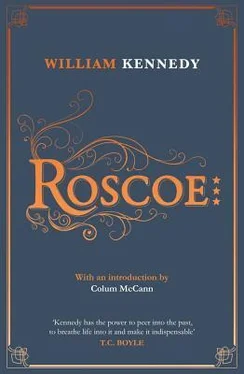Roscoe’s condition had become so confounding that he had asked Patsy McCall and Elisha Fitzgibbon, his two great friends, with whom he formed the triaxial brain trust of the Albany Democratic Party, to come to the hotel and talk to him, away from all other ears. Roscoe, at this moment staring across time, finds his father sitting in this corner. It is a chilly spring afternoon in 1917, the first Great War is ongoing in Europe, and Roscoe, twenty-seven, will soon be in that war. He’s clean-shaven, a lawyer whose chief client is the Fitzgibbon Steel mill, and he also has an eye on politics.
Felix Conway is a man of sixty-five, with a full, gray beard down to his chest, hiding his necktie. He’s wearing a waistcoat, suit coat, overcoat, and cap, but also covers himself with a blanket to fend off the deadly springtime drafts in the Ten Eyck Hotel lobby. Felix is a hotel-dweller and will remain one for the rest of his days, which are not many. He had been the thrice-elected, once-ejected Mayor of Albany, and made a sizable fortune brewing ale and lager. He was ousted from City Hall in 1893 after a lawsuit over voting fraud, but his Democrats regained City Hall in the next election and kept it for five years. In those years Felix was the Party’s elder statesman, with an office next to the new Mayor, and a luncheon table at the Sadler Room in Keeler’s Restaurant, where he held court for Democrats and influence salesmen of all varieties. This lush period for Felix ended in 1899.
In that year the Republicans took City Hall and also found they could afford lunch at Keeler’s great restaurant. But Felix could not bear the effluvia they gave off, so he went home for lunch. It took him six months to admit he was not suited to living full-time among his wife, two sons, and three daughters. And when he did admit it, he betook himself to the brand-new Ten Eyck Hotel and told the folks, Goodbye, dear family, I’ll be home Saturday afternoons and stay till Sunday tea. We’ll have a fine time going to mass, eating the home-cooked meal, won’t it be grand? Yes, it will, and then I’ll be done with you for a week.
The Republicans of 1917 are secure in their power, and the Democrats no longer even try to win, for it is more profitable to play the loser and take Republican handouts for assuming this pose. Yet Democratic reform elements endure, and there sits Roscoe beside his father, eavesdropping as the old man holds court for a steady, life-giving flow of pols, pals, has-beens, and would-bes. Bellhops daily place “reserved” signs on the marble tea table, the Empire armchair and sofa, in the Felix Conway corner. At the moment, Felix is in his chair, giving an audience to Eddie McDermott, leader of yet another reform faction that hopes to challenge Packy McCabe’s useless but invulnerable Albany Democratic Party organization in the 1917 primary.
Eddie stares into Felix’s eye, revealing his plans to reform the Party if he wins the primary, and reform the city if he wins the election. He leans farther and farther forward as he speaks ever-so-softly to Felix, finally rolling off the sofa onto one knee to make his message not only sincere but genuflectional, and he whispers to the Solomon of Albany politics: “You do want the Democrats to make a comeback and take City Hall again, don’t you, sir?”
“Oh, I do, I do,” says Felix. And he truly does.
“I have much to learn, Mr. Conway, but there’s one thing I can learn only from you, for nobody else has an answer, and I’ve asked them all.”
“What might that be, Mr. McDermott?”
“Once we take over the Party, how do we get the money to run it?”
Felix Conway throws his arms wide, kiting his blanket toward the outer lobby, startling Roscoe. He opens both his coats, pulls off his muffler, the better to breathe, and begins to laugh.
“He wants to know how you get the money,” Felix says to Roscoe, and then his laughter roars out of control, he rises from his chair, and shouts out, “How do you get the money? Oh my Jesus, how do you get the money!”
Then the laughter, paroxysmal now, seals Felix’s throat and bloats him with its containment. He floats up from his chair, still with a smile as wide as his head, and he rises like a hot-air balloon, caroming off the balustrade of the Tennessee-marble stairway, and he keeps rising on up to collide with the lobby’s French chandelier, where he explodes in a final thunderclap of a laugh, sending crystal shards raining down onto Eddie McDermott, the terrified reformer below.
Felix Declares His Principles to Roscoe
“How do you get the money, boy? If you run ’em for office and they win, you charge ’em a year’s wages. Keep taxes low, but if you have to raise ’em, call it something else. The city can’t do without vice, so pinch the pimps and milk the madams. Anybody that sells the flesh, tax ’em. If anybody wants city business, thirty percent back to us. Maintain the streets and sewers, but don’t overdo it. Well-lit streets discourage sin, but don’t overdo it. If they play craps, poker, or blackjack, cut the game. If they play faro or roulette, cut it double. Opium is the opiate of the depraved, but if they want it, see that they get it, and tax those lowlife bastards. If they keep their dance halls open twenty-four hours, tax ’em twice. If they run a gyp joint, tax ’em triple. If they send prisoners to our jail, charge ’em rent, at hotel prices. Keep the cops happy and let ’em have a piece of the pie. A small piece. Never buy anything that you can rent forever. If you pave a street, a three-cent brick should be worth thirty cents to the city. Pave every street with a church on it. Cultivate priests and acquire the bishop. Encourage parents to send their kids to Catholic schools; it lowers the public-school budget. When in doubt, appoint another judge, and pay him enough so’s he don’t have to shake down the lawyers. Cultivate lawyers. They know how it is done and will do it. Control the district attorney and never let him go ; for he controls the grand juries. Make friends with millionaires and give ’em what they need. Any traction company is a good traction company, and the same goes for electricity. If you build a viaduct, make the contractor your partner. Whenever you confront a monopoly, acquire it. Open an insurance company and make sure anybody doing city business buys a nice policy. If you don’t know diddle about insurance, open a brewery and make ’em buy your beer. Give your friends jobs, but at a price, and make new friends every day. Let the sheriff buy anything he wants for the jail. Never stop a ward leader from stealing; it’s what keeps him honest. Keep your plumbers and electricians working, and remember it takes three men to change a wire. Republicans are all right as long as they’re on our payroll. A city job should raise a man’s dignity but not his wages. Anybody on our payroll pays us dues, three percent of the yearly salary, which is nice. But if they’re on that new civil service and won’t pay and you can’t fire ’em, transfer ’em to the dump. If you find people who like to vote, let ’em. Don’t be afraid to spend money for votes on Election Day. It’s a godsend to the poor, and good for business; but make it old bills, ones and twos, or they get suspicious. And only give ’em out in the river wards, never uptown. If an uptown voter won’t register Democrat, raise his taxes. If he fights the raise, make him hire one of our lawyers to reduce it in court. Once it’s lowered, raise it again next year. Knock on every door and find out if they’re sick or pregnant or simpleminded, and vote ’em. If they’re breathing, take ’em to the polls. If they won’t go, threaten ’em. Find out who’s dead and who’s dying, which is as good as dead, and vote ’em. There’s a hell of a lot of dead and they never complain. The opposition might cry fraud but let ’em prove it after the election. People say voting the dead is immoral, but what the hell, if they were alive they’d all be Democrats. Just because they’re dead don’t mean they’re Republicans.”
Читать дальше












